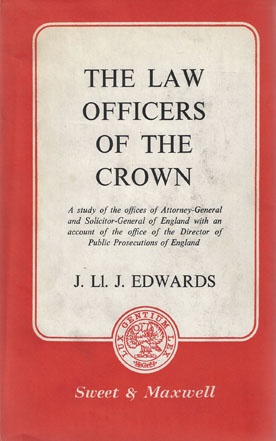
Out of Print
What are the responsibilities of the Law Officers of the Crown - the Attorney-General and the Solicitor-General? And how have their present legal, governmental, and constitutional functions developed?
Professor Edwards' purpose is to answer these questions, and in so doing he provides an authoritative and comprehensive basis for discussion of the roles of the Law Officers in contemporary society, and in any consideration for reform.
The Attorney-General is both the Sovereign's principal legal representative and the ministerial head of the Law Officers' Department. He thus exercises functions which range from certain criminal proceedings, in which case he is independent of Party and Parliament, to championing Government causes in the House, where he is independent of the Crown.
The study thus includes detailed consideration of the relation¬ship of the Attorney-General with the Solicitor-General (his deputy) with the Lord Chancellor, the Home Secretary, the Treasury Solicitor, and the Queen's Proctor. A full account is also given of the evolution and modern development of the office of the Director of Public Prosecutions.
Emphasis is placed throughout on the growth of the Attorney-General's accountability to the Crown, to Parliament, to the Courts and even to the Benchers of his own Inn: see the Enahoro Case. Explanation and illustration is provided by reference to legal, political, and international events ranging from Sir Edward Coke's prosecution of Raleigh in Elizabethan times to a very detailed and new treatment of the Campbell Case: here the author was assisted by access to Cabinet documents and his account has received the approval of the Cabinet Office.
Professor Edwards' readable book will be found incomparable in the scope and detail of its coverage, and invaluable in inform¬ing the legal profession, both practising and academic, and all professionally interested in constitutional and parliamentary affairs, and the general public; the work fills a noticeable gap in the literature relating to the organs of executive government.
The book, of course, has full Indexes of Cases and Statutes, a detailed Index and a Bibliography providing references to relevant books, articles, and pamphlets and parliamentary papers